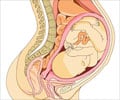A new study shows that women undergoing in vitro fertilisation (IVF) are four times more likely to have a stillborn baby than those getting pregnant naturally or using other treatments.
The risk of stillbirth is also four times as higher with a procedure called intracytoplasmic sperm injection (ICSI), where the sperm is injected directly into the egg.Researchers examined the effect of IVF and ICSI compared with women who either got pregnant naturally or who had fertility treatment other than IVF or ICSI.
The results of more than 20,000 pregnancies of single babies were analysed, with a clear increased risk for stillbirth after IVF and ICSI.
The authors said more research was needed into the exact reasons although the study suggests it may be the fertility treatments themselves that are responsible for the increased risk.
However, the authors, from Aarhus University Hospital in Denmark, said that these results should be interpreted carefully.
"It is important to remember that the risk of stillbirth is still very low among women pregnant after IVF/ICSI. At this stage we do not know whether the increased risk in women pregnant after IVF/ICSI is due to the fertility treatment or to unknown factors pertaining to couples who undergo IVF/ICSI. This needs further investigation," Dr Kirsten Wisborg, who led the study, said.
Advertisement
In fertile and sub-fertile women, the risk of stillbirth was 3.7 and 5.4 respectively. Overall, the risk among the women was 4.3 per 1,000 births.
Advertisement
"However, we found the risk was similar between sub-fertile couples, women who had conceived after non-IVF fertility treatment and fertile couples. This may indicate that the increased risk of stillbirth is not explained by infertility and may be due to other, as yet unexplained factors, such as the technology involved in IVF/ICSI or some physiological difference in the couples that require IVF/ICSI," Wisborg added.
The study has been published in the journal Human Reproduction.
Source-ANI
THK












